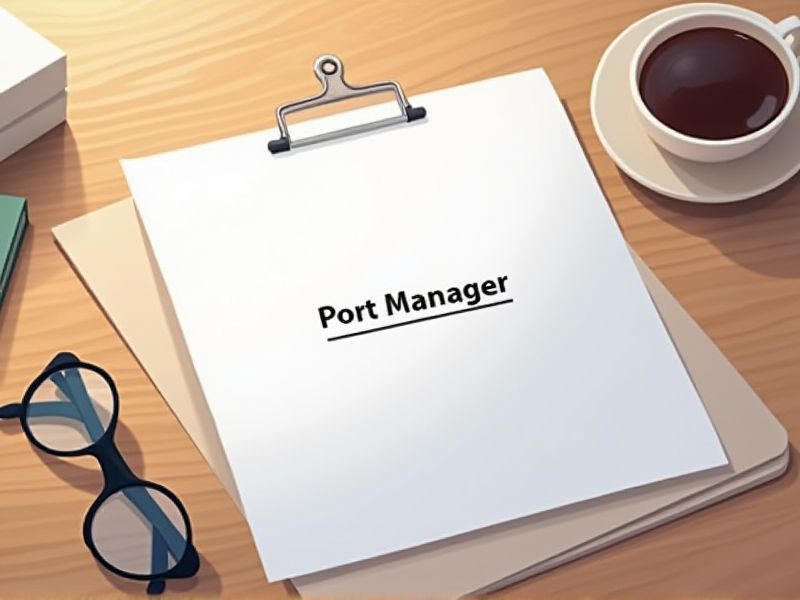
Managing a port necessitates a deep understanding of logistics, safety, and environmental regulations, making specialized certifications crucial. Certifications provide port managers with the skills to oversee operations efficiently and handle cargo complexities. They ensure compliance with international laws, enhancing skills in crisis management and security. Relevant certifications ensure port managers are equipped to meet industry standards and challenges. Here are some important certifications you may need for a Port Manager role.
Port Management and Operations Certification
Port Management and Operations Certification provides port managers with a structured understanding of international port standards and best practices, guiding effective operational strategies. Training through certification often leads to improved safety protocols and risk management, reducing accidents and costly disruptions. The certification enhances decision-making capabilities by offering insights into the latest industry trends, ensuring competitiveness in a rapidly evolving sector. Earning this certification can increase a manager's credibility among stakeholders, fostering trust and facilitating smoother collaboration.
International Ship and Port Facility Security (ISPS) Certification
The ISPS Certification enhances port security by establishing a standardized framework to assess and mitigate risks, which is critical for ensuring safety. Compliance with ISPS regulations boosts the port's credibility and facilitates seamless international trade operations by meeting global security standards. Port managers can effectively coordinate with international security agencies, leading to more efficient management and incident response. Certification also minimizes the risk of security-related disruptions, protecting the port's infrastructure and assets from potential threats.
IMO Maritime Safety Management Certification
The IMO Maritime Safety Management Certification ensures that port managers adhere to international safety standards, reducing the risk of maritime accidents. This certification fosters a culture of safety and accountability within port operations, which enhances operational efficiency. Compliance with international regulations through certification increases trust and collaboration with global shipping companies. Certification can lead to reduced insurance costs due to demonstrated commitment to safety protocols.
Occupational Health and Safety Administration (OSHA) Certification
OSHA certification ensures that port managers understand safety regulations, reducing the risk of workplace accidents. Knowledge from the certification helps in identifying and mitigating potential hazards, enhancing employee protection. Compliance with OSHA standards is legally required, preventing possible legal repercussions for the port authority. Safe working conditions improve operational efficiency, leading to higher productivity and reduced downtime.
Hazardous Materials (HAZMAT) Certification
A Port Manager must possess HAZMAT Certification to ensure compliance with federal regulations governing the transport and handling of hazardous materials. This certification provides essential knowledge to safely oversee the storage and movement of dangerous goods, minimizing risk to port personnel and the environment. Port Managers must demonstrate readiness to handle potential emergencies involving hazardous substances. Certification enhances the port's operational efficiency by aligning with international safety standards, which fosters trust with global shipping partners.
Project Management Professional (PMP) Certification
A Port Manager oversees complex operations involving logistics, transportation, and stakeholder management, where PMP certification provides essential skills for effective project management. It structures the methodological approach to planning, executing, and closing projects that are critical in high-stake environments like ports. The certification validates the individual's capability to lead and direct teams, ensuring that projects meet deadlines and budgets. As ports involve multifaceted projects, PMP enhances risk assessment and mitigation strategies crucial for minimizing potential disruptions.
Certified Supply Chain Professional (CSCP)
Being a Certified Supply Chain Professional (CSCP) equips a Port Manager with comprehensive insights into global supply chain management, essential for handling complex logistical challenges. The certification enhances strategic decision-making skills, crucial for optimizing port operations and managing resources efficiently. It provides specialized knowledge in supply chain risk management, helping to mitigate potential disruptions at the port. Understanding advanced supply chain concepts and technologies through CSCP ensures the Port Manager stays competitive in the rapidly evolving maritime industry.
Certified in Logistics, Transportation, and Distribution (CLTD)
The CLTD certification provides a comprehensive understanding of materials flow and distribution strategies, which helps port managers improve operational efficiency. It offers insights into contemporary logistics technologies, enabling managers to implement the latest advancements for optimized port operations. Certified individuals demonstrate a commitment to professional development, which can enhance trust and credibility with stakeholders. This credential equips port managers to address complex challenges related to supply chain dynamics effectively.
IMO STCW Certification
Port managers need IMO STCW Certification to ensure they comply with international maritime safety and environmental protection standards. Possessing this certification leads to enhanced understanding of safety procedures and emergency protocols, reducing workplace hazards. With proper training, port managers can effectively oversee operations, leading to smoother and safer port activities. With global shipping regulations becoming stricter, such certification assures stakeholders of the port's adherence to international laws.
Sustainable Port Operations (Green Port) Certification
Sustainable Port Operations Certification ensures port managers implement eco-friendly practices, reducing environmental impact and aligning with global sustainability goals. The certification can lead to increased efficiencies, including reduced energy consumption and waste, improving the overall operational cost-effectiveness. Ports with this certification often attract more business, as companies prefer eco-conscious partners to enhance their own sustainability efforts. Regulatory compliance is more seamlessly achieved, as the certification prepares port operations to meet growing environmental regulations and standards.
Summary
With Port Manager certification, you can expect enhanced efficiency in port operations due to improved strategic planning and management skills. Certification enables you to implement best practices, which leads to reduced operational costs and increased safety standards. Your knowledge in regulatory compliance becomes extensive, minimizing the risk of legal issues. You cultivate a competitive advantage for your port, attracting more business and fostering economic growth.
